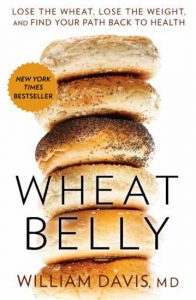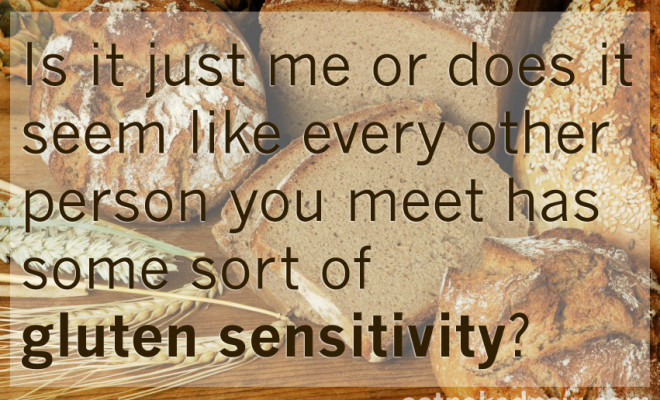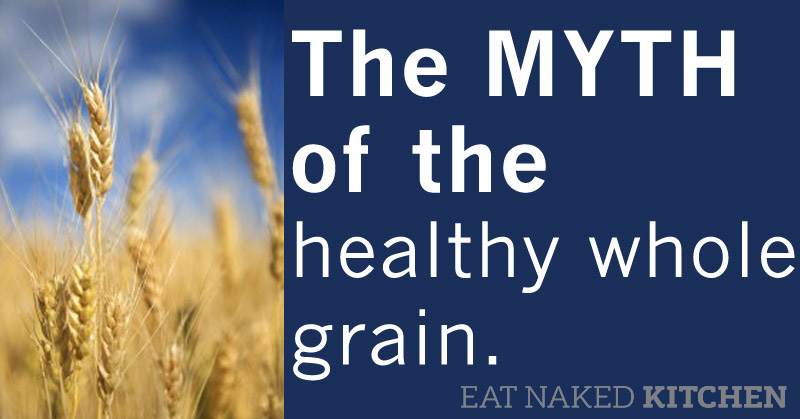Is it just me or does it seem like every other person you meet has some sort of gluten sensitivity? Whether it’s a full-fledged auto-immune response (celiac disease) or a mild tummy grumbling and bloat (gluten intolerance) or even some seemingly unrelated health issue (migraines anyone?), gluten sensitivity has become a real concern.
But wait a minute… We’ve been eating wheat in all its many delicious forms for thousands of years.
Why is there suddenly such a huge problem?
 At first I thought I was just seeing more of these cases because this is my line of work – being in the business of rectifying food-related tummy troubles, of course I’m going to see gluten intolerance everywhere I look. But after reading Dr. William Davis’ bestselling book Wheat Belly, I’m realizing that yes, this is a huge issue, and more importantly, now I understand why.
At first I thought I was just seeing more of these cases because this is my line of work – being in the business of rectifying food-related tummy troubles, of course I’m going to see gluten intolerance everywhere I look. But after reading Dr. William Davis’ bestselling book Wheat Belly, I’m realizing that yes, this is a huge issue, and more importantly, now I understand why.
In a nutshell: the wheat we are eating today is not the same wheat our grandparents ate.
Through extensive hybridization in the interest of drought resistance or increasing properties that make wheat yield better dough, we have ultimately created an entirely new grain with a different biochemical structure than its more unadulterated ancestors.
What does this mean?
It means that we’ve tweaked and tweaked and tweaked the genetic makeup of the grain through cross-breeding. The process is different from genetic modification, but the impacts of extensive hybridization are similar in that they can create something entirely new biologically. The result is a grain that converts to sugar more rapidly, contains entirely new (gut-damaging) forms of the gluten protein, encourages addictive patterns, and stimulates appetite. Croissant, anyone?
Did you know that two slices of whole wheat bread (yes, whole grain bread with all that fiber) cause a bigger and faster blood sugar spike (glycemic index 72) than a spoonful of table sugar (glycemic index 59)? Doesn’t matter if it’s multi-grain with all sorts of seeds and other goodies added; doesn’t matter if it’s sprouted wheat. The impact on your blood sugar is still greater than table sugar.
This has far-ranging impacts. A spike in blood sugar causes a spike in insulin, one of our body’s leading fat storage hormones. Hence the simple equation that many of us have experienced directly: eat bread –> spike blood sugar –> spike insulin –> gain weight. We all know bread isn’t the fastest path to loosing that belly bulge. This is why.

But it goes further than a few unwanted pounds. With spikes in blood sugar and insulin, we’re on the pathway to diabetes, which is where these spikes lead us if left unchecked. It also contributes to heart disease, speeds aging, and damages our skin.
Something I didn’t know about wheat but have certainly experienced first hand is its addictive and appetite stimulating qualities. Ever notice that when you do eat wheat, it’s hard to stop? That basket of warm gooey bread comes out at the restaurant, and all hell breaks loose even among the most diet-disciplined. Compounds created by digested wheat bind to opiate receptors in our brains and have similar effect to morphine. In studies done by the University of Michigan, when the euphoric reward of wheat ingestion was blocked, participants consumed between 23 and 33% fewer calories per meal. So without this morphine-like response from bread, we eat less overall. That’s significant.
As Dr. Davis explains, “Outside of intoxicants such as ethanol (like that in your favorite merlot or chardonnay), wheat is one of the few foods that can alter behavior, induce pleasurable effects, and generate a withdrawal syndrome upon its removal.”
So… cut out the wheat and leave it out forever?
That’s certainly one option. If that feels too extreme, consider reducing it greatly, or doing a 30 day wheat-free challenge. Let your body be your guide. See what you notice and how you feel when you take it out for a solid month.
If you look at your diet and see wheat everywhere (which it is, unless you’re consciously and ruthlessly avoiding it), consider doing our 14-day Sugar Control detox. In addition to cleansing yourself of sugar, you’ll cleanse the wheat (and other starches) and can integrate it slowly when you come back to “normal” to see how your body responds.




YOu Rock!
I love your notes….
This one was really good for my family!
We live in a 98% wheat free household.
It’s great….Rice pasta….Udi’s Gluten free bread….whole foods…and no microwave
We also drink Goat milk and the new Flax milk…..
hope all is well with you
Love, Shauna
I have been following Wheat Belly for almost two months and I can say without hesitation that it has changed my life. I am a person who has been overweight since I was a child and I was a HUGE wheat addict….all my favorite things were white flour based and I went through a five pound bag of sugar a month JUST putting it in my coffee! Making the decision to walk away from it and never look back has resulted in a long list of benefits I never imagined; I initially tried it simply because I was having allergy symptoms I couldn’t get rid of. They are gone. So it all the joint pain and inflammation, heartburn, stiffness, poor sleep, and at least 15 pounds so far. I do not indulge occasionally, that is an exercise in ‘petting the tiger’ that I am not interested in. I am 42. I feel 25. Was putting down the garlic bread totally worth it? You better believe it. Because I don’t eat GF foods with wheat substitutes that spike blood sugar and cause those cravings, I feel healthy, happy, and satisfied with smaller portions and I’m experiencing all the amazing variety that is out there once all the processed crap is set aside. I feel like I’ve been given a gift.
Hello, Margaret!
Enjoying your website and great information, thank you!
Question:
I read Wheat Belly when it first came out and have been avoiding bread since then. Recently though, I began adding Dave’s Killer Bread, specifically the Sprouted Wheat Bread back into my diet in moderation. I see that you wrote that even sprouted bread still has the same negative effects on our bodies. Is that still true if the wheat is ORGANIC?
Looking forward to your response!
Sincerely,
Nanci
I was on a 8 week liver cleanse where I ate 3 meals a day. vegetable juice and fruit in the mornings. chicken sandwich with dave’s killer organic bread (two slices) for lunch. gluten free pasta for dinner.
after 8 weeks i switched that pasta to a whole wheat pasta and it wasn’t pretty. i had a burger and extra bread the day after and that wasn’t pretty either. anyway, i think i have a gluten sensitivity but dave’s killer bread doesn’t seem to effect that gluten sensitivity.
i’d like to know how UDI’s breads tie into the wheat belly diet — I’ve been on the wheat belly diet for 2 years and a m off my RA meds — and feel girt — but it would be nice to have a “bread” and Udi’s seems ok.
Advise me!!
Udi’s – like any gluten-free product – is good for the occasional treat, but I wouldn’t make it a regular staple of your diet. While it’s gluten-free, it’s still very high in starch and has lots of fillers/stabilizers/etc. Ultimately it’s a processed food. A gluten-free one, but processed nonetheless.
Margaret. This is Ellen (RWS, NTP) in Eugene. I remember recently you had some information on a gluten free sourdough in Portland. I can not seem to find this info. Can you send me the name and where to purchase in Portland? I have a client heading up North this weekend who wants to purchase a few loaves. Thanks. Email to pathwaysforhealth@gmail.com. Thanks.
Hi Ellen. Emailed you from info@eatnakedkitchen.com. Thanks!